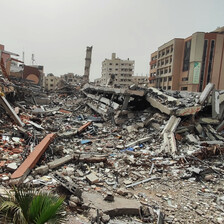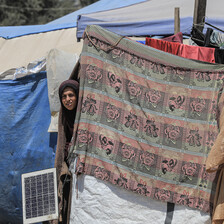The Electronic Intifada 17 December 2023

Some 80 percent of Gaza’s population have been forcibly displaced, many crowding into UN facilities like this school in Nuseirat refugee camp in the central Gaza Strip.
APA imagesIn a house in Rafah in the southern Gaza Strip, Husson, her four sons and their families have sought shelter with Husson’s sister and her family.
Husson (which means beauty in Arabic) is 84. Her journey to Rafah, from the Beach camp in Gaza City, which she had to leave because of Israel’s bombardment, was long and perilous.
On the way, she and her sons took shelter in a school, until that too was no longer safe.
And through it all, she remembered the original Nakba, the homelessness, fear and massacres of 1948, when she and her family were displaced from their home in the Ramle area of Palestine.
Even then, she told The Electronic Intifada, this is as bad, if not worse.
“I regret moving here. If I had the chance again, I would stay in the Beach camp rather than experience what is more catastrophic than the ‘48 Nakba.”
Husson was born in 1939 to a middle income family in the village of Zarnouqa in the Ramle area.
She was the first of 11 children, seven girls and four boys. Her father was a farmer who worked for a large merchant while her mother sold produce from a stall.
The family would store grains and barley underground.
But while relatively wealthy, Husson never received an education. She was born during the Palestinian revolt against Britain’s then colonial administration in Palestine and the Zionist colonization project which it sponsored.
The revolt lasted from 1936 to 1939.
Times were difficult and the cost of living was high.
She remembers the years of the Nakba as years of displacement, fear, bombings and massacres.
She and her family were displaced all the way to Gaza.
Those lost
Eventually, after marrying young, Husson settled in the Beach refugee camp in Gaza City.
Her family grew, eventually comprising nine boys and four girls.
There were losses along the way. Her first born Jumaa died just 21 days old.
Then, 35 years ago, her husband Khalil, who worked with a local charity, fell on the street.
At al-Shifa hospital in Gaza City, he was diagnosed with high blood pressure. It kept getting worse until he lost the use of an arm and a leg.
He died shortly after.
His oldest sons decided to step up. Mahmoud and Ibrahim found work in Israel, reasoning that they needed to make enough money to provide for the family.
Husson always had a soft spot for Ibrahim, who would always buy her presents, and was generous to others, giving away “too much” to those in need.
But both sons passed away before her.
Ibrahim had a sudden stroke. Mahmoud died of high blood pressure.
In all, and over the years, from her 13 children, seven have passed away.
Israel’s violence has been ever present in Husson’s long life. During Israel’s aggression on Gaza in 2014, the Israeli military bombed the home of her youngest son Salah.
Salah’s baby daughter Toqa was killed, his other daughter Hala broke her arm and his wife had to receive treatment for six months because of her injuries.
Salah himself – who was not at home at the time of the bombing – was so affected that he collapsed upon hearing the news. Gradually, he lost the ability to walk.
Doctors could not find any medical explanation for his disability.
He now uses a wheelchair. Hala helps to feed him, wash him and take him to the bathroom.
Genocide
At the beginning of Israel’s latest genocidal attack on Gaza, Husson and her family had resolved that come what may, they would stay in their modest home in the Beach camp.
“In all the previous aggressions, I had never left my home,” Husson told The Electronic Intifada. “I would never repeat what happened in ‘48.”
But the fighting came closer and Israel’s indiscriminate bombing grew ever more deadly.
As civilian infrastructure – homes, hospitals, mosques, schools – around them was reduced to rubble and it became clear that no international power would intervene, the situation felt ever more dangerous.
One afternoon, while Husson was resting next to Salah, the house suddenly shook with the impact of a nearby explosion, piercing the corrugated iron roof.
Their neighbor’s house had been bombed and many houses around them were completely or partially destroyed. Israeli warplanes then targeted the ambulance and civil defense crews that tried to rescue civilians.
It was left to the young men of the area to search through the rubble for casualties.
No one, as it turned out, was critically injured in that bombing. But Husson started to be increasingly worried for the safety of her family, especially Salah, who uses a wheelchair.
Reluctantly, they decided to move to the nearby Abu Assi school in search of safety.
During the first period at the school, people used to go to their homes every morning to shower and cook.
In the beginning, food was available. In time, it started to become scarce and expensive.
They lived on fried tomatoes, potatoes, and eggplant. Water supplies ran low, affecting everything from cooking to hygiene, a situation that got worse as the number of displaced people rose.
The war intensified in the north. Bombings became increasingly random and increasingly targeted the center of Gaza.
Everything seemed to be a target.
“They were miserable days,” Husson said. “Imagine 65 people, men, women, children, infants, disabled, and elderly all in one classroom using a single bathroom.”
Killing Khader
The bombing became incessant. Missiles landed all around the school, targeting the surrounding houses.
One day, the nearby Ahmed Yassin mosque was entirely destroyed.
“Everyone around me ran out of the class. People were screaming. My heart was racing and the thoughts of the Nakba were haunting me,” Husson said.
The school emptied in panic, leaving just Hasson, Salah and Hala, who tried and failed to carry her father and grandmother out.
When the bombing eased, some men arrived to carry her and her son outside the school until her other sons arrived.
They headed south.
“On my way south, I saw people who had been bombed and body parts scattered everywhere,” Husson said. “Anyone who thought to turn right or left or even just look back was immediately killed.”
Her son Khader stayed north, refusing to be displaced, refusing to help Israel’s attempt at the wholesale ethnic cleansing of Gaza.
He made sure that his wife and six children found shelter at the Nuseirat refugee camp in central Gaza, but decided to stay in a school near his own home, which had already been destroyed in the bombing.
Just days after she arrived in the south, Husson learnt that Khader had been killed in an Israeli airstrike. His body had only been discovered in the school after a number of days.
He was buried, at the school, during the brief truce in November, without any family present.
“I couldn’t kiss or hug him for the last time. Israel prevented me from saying farewell to my poor son.”
For now, Husson and her four sons are staying with Husson’s sister in Rafah, in the very south.
Husson regrets moving. She is not afraid of death.
It is this life she fears, she told The electronic Intifada, a life that has involved constant displacement and catastrophic loss.
She insists that whatever happens, her people will one day return and liberate Palestine.
As for her, she is struggling.
“One heart cannot bear two Nakbas.”
Hanin A. Elholy is a researcher, writer and translator based in Gaza.





